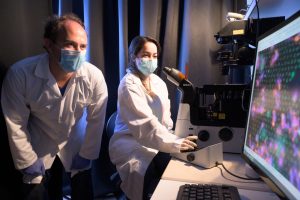
Nanomaterial Surface Coatings Could Prevent COVID-19 Spread
Nanomaterial Surface Coatings Could Prevent COVID-19 Spread
May 5, 2020
Medical Research, Nanotechnology
The Times of Israel — BGU researchers have developed surface coatings based on nanomaterials, with both antiviral and antibacterial properties, that could be used to fight the current coronavirus.
With funding from the Israel Innovation Authority, the researchers are working to determine the impact of the surface coatings, which contain nanoparticles of safe metal ions and polymers, on the SARS-CoV-2 coronavirus, which is responsible for the current COVID-19 pandemic.
In light of the possibility that the virus can spread through contaminated surfaces, it is important to sterilize surfaces with high contamination potential, such as doorknobs, elevator buttons or handrails in public areas, particularly in hospitals and medical clinics.
Current disinfectants used to fight the virus and other bacteria are mainly based on chemicals such as sodium hypochlorite (bleach) or alcohol and provide only a temporary measure.
Because certain metals can be lethal for viruses and bacteria, even in small quantities, and are not poisonous to humans, the nanoparticles of the ions can have a strong antiviral effect, and can eradicate virus particles that adhere to the surface with a long-term effect.
In proof of concept experiments, Prof. Angel Porgador, from BGU’s Department of Microbiology, Immunology and Genetics and the National Institute for Biotechnology in the Negev, and Dr. Mark Schwartzman of BGU’s Department of Materials Engineering, studied the effect of the surfaces coated with nanoparticles of various metals on the infection rate of lentiviruses, which belong to the HIV family, in human cells.
The findings showed that that surfaces coated with copper nanoparticles strongly block infection of the human cells by the virus. The experiments are an indication of the huge potential of copper ions in preventing surface-mediated infection with SARS-CoV-2, as well.
Prof. Porgador and Dr. Schwartzman’s research activity is part of BGU’s COVID-19 Response Effort, which is headed by Prof. Porgador.
Based on these findings, the researchers are now developing antiviral coatings that can be painted or sprayed on surfaces.
The coatings are based on polymers, which are the base materials of plastics and paints, and contain nanoparticles of copper and other metals. The nanoparticles embedded in the polymer enable the controlled release of metal ions onto the coated surface.
Because the release of ions is extremely slow, the coating can be effective for weeks or even months, and it will reduce the infectivity of the virus particles more than tenfold.
“Until now using such metals for anti-viral applications has encountered significant challenges due to the nature of the metals, such as the tendency to oxidize and corrode,” says Dr. Schwartzman.

Ph.D. student Esti Toledo and postdoctoral fellow Guilaume Le Saux from the Department of Materials Engineering working in Dr. Mark Schwartzman’s lab on nanocoatings to protect against COVID-19 transmission
“Nanoparticles provide a solution to these obstacles. Another advantage of nanoparticles is the large surface area-to-volume ratio, which results in an efficient antiviral surface area using a relatively small amount of metal. Additionally, nanoparticles of antiviral metal can be easily embedded in a polymer that can coat the relevant surfaces for extended periods of time,” adds Dr. Schwartzman.
“The need to develop antiviral coatings has greatly increased recently, with the SARS-CoV-2 outbreak, and this need will likely remain high even after the pandemic ends, due to increased awareness,” says Josh Peleg, chief executive officer, BGN Technologies, in charge of bringing BGU’s technological innovations from the lab to the market.
The product, when developed, can be applicable for medical settings, as an anti-pathogenic substance in places with increased risk of contamination such as hospitals, in home use, and in public spaces such as schools, airports, public transportation, and cinemas, says Peleg.




